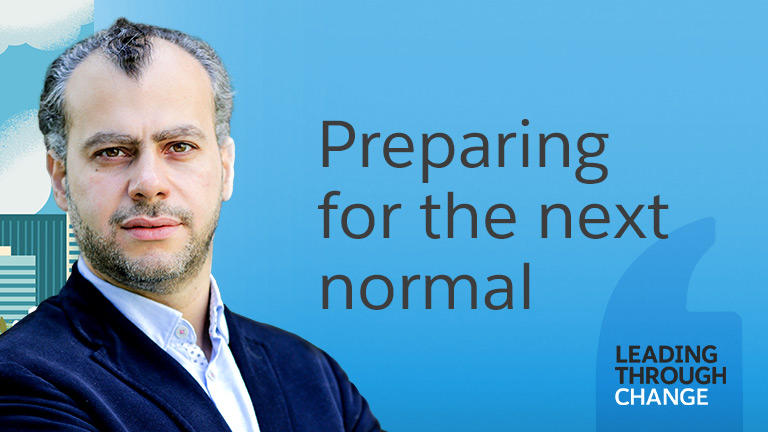As businesses begin to reopen their workplaces, adapt new ways of working and move into growth mode, building resiliency is more important than ever. And few leaders are better qualified to speak about resiliency than Louai Al Roumani. Al Roumani was head of finance and planning at one of Syria’s largest banks when civil war broke out in 2011, and despite having to lead strategic planning during one of the most hostile and dangerous business environments imaginable, Al Roumani made sure that the savings of Syrians from all over the country was protected.
Louai Al Roumani recently joined us for a webinar where he explained how he faced down challenges in a war zone, and how leaders in the current climate can overcome adversity to build resiliency.
Building resiliency in the New Normal
A decade ago, Syria was on an economic upswing and the future looked bright. New buildings were rising up seemingly daily, the souks were alive with activity, and the feeling of possibility could be felt in every alley and citadel. For Louai Al Roumani, the parallels to Dubai were evident, and as his bank broke ground on a new HQ in Damascus, the future seemed limitless.
But in early 2011, as Al Roumani looked out his office window at Banque Bemo Saudi Fransi, the square below began to fill with people, chants began echoing through the streets, and a sense of uncertainty began to rise. In Syria, everything was about to change. Suddenly, places that had been used for optimistic photo-ops just days before were pocked by bullets and rockets; the shells of half-constructed buildings were covered in political slogans; sirens wailed late into the night, and in branches across the country, the lifesavings of thousands of Syrians was at risk. When long queues started to form outside of the banks, Al Roumani knew that the situation was critical.
Initially, he had no idea how to navigate the uncertain climate, but he quickly adapted. “I learned that there are certain principles that can be applied to enhance one’s chances of thriving during crisis,” Al Roumani says. He’s gone on to detail those principles in his new book Lessons From a Warzone. Here are a few of his top tips for building resiliency and succeeding in tumultuous times.
Louai Al Roumani’s top 6 tips for thriving in times of crisis
1) Build trust by always doing the right thing: When a huge queue formed outside of his bank at 8:55 in the morning, Al Roumani was terrified. He knew that opening that door would lead to a panicked run on withdraws that could cripple the branch. Should they delay withdraws or impose daily limits? With no playbook for this moment, he decided to give the customers what they wanted. The bank carried out bundles of bank notes and accommodated every request. In the end, many of the customers wound up returning to the bank and re-depositing their funds: Al Roumani’s team had earned their trust. Less customer-centric, more restrictive banks had a much harder time getting their customers back, and an even harder time earning back their trust. “People will remember what you did in the darkest hour”, Al Roumani says.
2) Be bold: Some people tend to step back and become smaller during a crisis, but for Al Roumani, this is the time to go big. Not only does acting boldly present more opportunities for businesses, it enables them to lead by example. People remember and admire fearlessness, especially in a time when everyone else seems to be running scared.
3) Actions speak louder than word, so get things done: When a key founder left BBSF, there was immediate concern about the impact on their brand. But Al Roumani quickly discovered that their concerns were unfounded – even the organisation’s name did not matter. All that mattered was if they could deliver when their customers needed them most, which they did time and time again. In times of crisis, talk is cheap – it’s your actions that define you.
4) The long-term should always shape your actions: Crisis changes our perceptions of time and it’s easy to get caught up in the moment-to-moment whirlwind of the present, but savvy business leaders should always keep an eye on the long-term, especially if their competitors aren’t.
5) Concentrate on what you can control: When war broke out, Syria became a country plagued by destruction, where every day was perilous and uncertain. But Al Roumani knew that BBSF could only focus on things that were in their control: trust, liquidity and the ability to loan competitively. They prioritised these critical success factors, even at the expense of profit.
6) Be unswerving in your vision, but flexible in your tactics: BBSF was carrying on business in a war zone, where rockets, bombs and bullets posed daily threats, and where 25% of their branches would ultimately be destroyed. How on earth was it possible to plan strategically in such an environment? For Al Roumani, it came down to prioritising situational leadership, where leaders have the capacity to do things differently depending on the situation.
This potential to remain agile has been a key component of succeeding in the New Normal, and as the pre-Covid business landscape recedes further and further in our rear-view mirror, the capacity to react to bumps in the road is becoming critical. And, as Louai Al Roumani has pointed out, we need to boldly take the wheel, remain undeterred from our goal, and always do the right thing, no matter the cost.
To see more from Louai Al Roumani, pick up a copy of his book, Lessons From a Warzone. And to find more great advice for navigating the New Normal in a post-Covid world, drop by Work.com.








